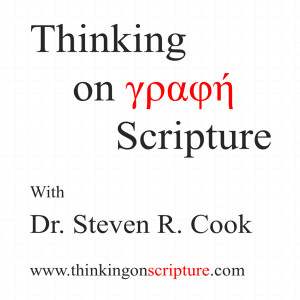The word prophet translates the Hebrew word נָבִיא nabi (Grk. προφήτης prophetes), which means “speaker, herald, preacher,”[1] and refers to one who was called to be the spokesman for another; for example, it was used of Aaron who was the spokesman for Moses (Ex.7:1-2). The prophets were primarily men, but did include women such as Miriam (Ex. 15:20), Deborah (Jdg. 4:4), Huldah (2 Ki. 22:14), and Anna (Luke 2:36). They were channels of communication who received God’s revelation directly and then communicated it to others (Ex. 4:12; Jer. 1:9; Amos 1:3), and sometimes they served as intercessors to God (Gen. 20:7; Ex. 32:10-14; 1 Sam. 12:17, 19). There were true prophets to be obeyed (Deut. 18:18; 34:10-11; 1 Sam. 3:20; 2 Chron. 25:15; 28:9; Hag. 1:13; Acts 11:27-28; 21:10-11) and false prophets to be ignored (Deut. 13:1-5; 18:21-22; Neh. 6:12-13; Jer. 23:25-28; Matt. 7:15; 24:24; Acts 13:6; 2 Pet. 2:1-3; 1 John 4:1-3; Rev. 2:20). In the NT, the gift of prophecy was for the edification of others (1 Cor. 14:3).
We know about specific prophets such as Elijah and Elisha because they’re mentioned in the writings of others (1 Ki. 17:1-2; 19:15-21), but there were numerous unnamed prophets mentioned as well (1 Sam. 10:5; 19:20; 1 Ki. 18:4). Of all the prophets mentioned in Scripture, only sixteen wrote books, and these are classified into two groups known as the Major Prophets and Minor Prophets. This distinction is based on the overall size of their writings and not their importance. The Major Prophets are Isaiah, Jeremiah, Ezekiel and Daniel.[2] The Minor Prophets are Hosea, Joel, Amos, Obadiah, Jonah, Micah, Nahum, Habakkuk, Zephaniah, Haggai, Zechariah, and Malachi. Some of the Minor Prophets were called to preach to the ten northern tribes of Israel and others to the two southern tribes of Judah, and their ministries span a period of roughly four hundred years.
In Jewish tradition the Minor Prophets are referred to as the Book of the Twelve because they were all written on a single scroll. The English Bible follows the order set forth in the Hebrew Bible, but this order is not chronological. The following charts provide an overview of prophet, audience, approximate date of ministry, his contemporaries, and the world power that was often the prevailing threat upon God’s people.
Overview of the Twelve Minor Prophets[3]
Prophet
Audience
Date
B.C.
Contemporaries
World Power
Hosea
Israel
756-725
Isaiah, Amos, Micah
Assyria
Joel
Judah Pre-exilic
830-810
Elisha
Assyria
Amos
Israel
760-757
Hosea
Assyria
Obadiah
Judah (Edom)
848
Elijah
Assyria
Jonah
Nineveh
ca. 800
None
Assyria
Micah
Judah Pre-exilic
735-690
Isaiah, Hosea
Assyria
Nahum
Judah Pre-exilic
ca. 640
Zephaniah
Assyria
Habakkuk
Judah Pre-exilic
608-597
Jeremiah, Ezekiel, Daniel
Babylonia
Zephaniah
Judah Pre-exilic
640-630
Nahum, Jeremiah
Assyria
Haggai
Judah Post-exilic
520
Zechariah
Medo-Persia
Zechariah
Judah Post-exilic
520-475
Haggai, Esther
Medo-Persia
Malachi
Judah Post-exilic
ca. 435
Nehemiah
Medo-Persia
Chronological Order of the Twelve Minor Prophets
Prophet
Audience
Date
B.C.
Contemporaries
World Power
Obadiah
Judah (Edom)
848
Elijah
Assyria
Joel
Judah Pre-exilic
830-810
Elisha
Assyria
Jonah
Nineveh
ca. 800
None
Assyria
Amos
Israel
760-757
Hosea
Assyria
Hosea
Israel
756-725
Isaiah, Amos, Micah
Assyria
Micah
Judah Pre-exilic
735-690
Isaiah, Hosea
Assyria
Nahum
Judah Pre-exilic
ca. 640
Zephaniah
Assyria
Zephaniah
Judah Pre-exilic
640-630
Nahum, Jeremiah
Assyria
Habakkuk
Judah Pre-exilic
608-597
Jeremiah, Ezekiel, Daniel
Babylonia
Haggai
Judah Post-exilic
520
Zechariah
Medo-Persia
Zechariah
Judah Post-exilic
520-475
Haggai, Esther
Medo-Persia
Malachi
Judah Post-exilic
ca. 435
Nehemiah
Medo-Persia
A Brief History of Israel
Israel—as the special people of God—began with a unilateral covenant which God made with Abraham, promising “I will make you a great nation” (Gen. 12:2). Though Abraham had children by different women (Sarah, Hagar, and Keturah), the Abrahamic promises were restated only through Isaac (Gen. 17:19-21) and Jacob (Gen. 28:10-15). Because of a crippling encounter with God, Jacob’s name was changed to Israel, which means “he who wrestles with God” (Gen. 32:24-30). The sons of Israel (i.e. Jacob) went into captivity in Egypt for four hundred years as God had foretold (Gen. 15:13), and remained there until He called them out through His servants Moses and Aaron (Ex. 3:1-10). God delivered Israel from Egyptian bondage through a series of ten plagues that destroyed Pharaoh and the nation (Exodus chapters 5-14). Then God entered into a bilateral covenant relationship with Israel at Mount Sinai (Ex. 19:1-8), and gave them 613 commands—which comprise the Mosaic Law—and these commands are commonly divided into moral, civil, and ceremonial codes. Israel would know blessing if they obeyed God’s commands (Deut. 28:1-15), and cursing if they did not (Deut. 28:16-68). The nation of Israel remained in the wilderness for forty years while God tested and humbled them (Deut. 8:2-5). After Moses died, God brought the Israelites into the land of Canaan (i.e. the land promised to Abraham) under the leadership of Joshua (Deut. 31:23; Josh. 1:1-9), and there the land was divided, giving a portion to each of the descendants of Jacob. After Joshua died (Josh. 24:29-31), Israel repeatedly fell into idolatry and suffered divine discipline for their rebellion (read Judges). This went on for nearly three hundred years as Israel fell into a pattern of idolatry, after which God would send punishment, then the people would cry out to God, Who would relent of His judgment and send a judge to deliver them, then the people would serve God for a time, and then fall back into idolatry. The period of the Judges is marked by people who did not obey the Lord, but “did what was right in their own eyes” (Judg. 17:6; 21:25). Samuel was the last of Israel’s judges, and then the people cried for a king because they wanted to be like the other nations (1 Sam. 8:4-5). God gave them their request (1 Sam. 8:22), and Saul became the first king in Israel (1 Sam. 10:1). Though Saul started well, he quickly turned away from the Lord and would not obey God’s commands. Saul reigned for approximately 40 years and his leadership was basically a failure (1 Sam. 13:1; cf. Acts 13:21). Later, God raised up David to be king in Israel (1 Sam. 16:1-13), and David reigned for 40 years and was an ideal king who followed God and encouraged others to do the same (1 Ki. 2:10-11). God decreed David’s throne would be established forever through one of his descendants (2 Sam. 7:16; Ps. 89:3-4), and this is Jesus (Luke 1:31-33). Solomon reigned for 40 years after David (1 Ki. 2:12; 11:42-43), and though He was wise and did many good things (ruled well, built the temple, wrote Scripture, etc.), he eventually turned away from God and worshiped idols (1 Ki. 11:1-10). The nation was united under Saul, David, and Solomon.
Because of Solomon’s idolatry (1 Ki. 11:1-10), God divided the kingdom into two parts (1 Ki. 11:11-41; 12:1-33). Solomon’s son, Rehoboam, ruled over the two southern tribes (Judah) and Jeroboam ruled over the ten northern tribes (Israel). Israel—the northern kingdom—had 19 kings throughout its history and all were bad, as they led God’s people into idolatry (i.e. the “sins of Jeroboam” 1 Ki. 16:31; 2 Ki. 3:3; 10:31; 13:2). The ten northern tribes came under divine discipline because of their idolatry and were destroyed by the Assyrians in 722 B.C. Judah—the southern kingdom—had 20 kings throughout its history and 8 were good (some more than others), as they obeyed God and led others to do the same (they were committed to the Lord like David, 1 Ki. 15:11). However, Judah repeatedly fell into idolatry—as the 10 northern tribes had done—and were eventually destroyed by the Babylonians in 586 B.C. The dispersion of Israel was promised by God if they turned away from Him and served other gods (Deut. 28:63-68).
[1] Ludwig Koehler et al., The Hebrew and Aramaic Lexicon of the Old Testament (Leiden: E.J. Brill, 1994–2000), 661–662.
[2] English translations of the Bible place Daniel among the prophets, and there is good cause for this, since Daniel received direct revelation from God and was called a prophet by Jesus (Matt. 24:15). Daniel is also listed among the prophets in the Septuagint (the Greek translation of the Hebrew Old Testament). However, the Hebrew Bible—called the Tanakh, an acronym for the Torah (Law), Nebi’im (Prophets), and Kethuvim (Writings)—places Daniel among the Writings (Psalms, Proverbs, Job, etc.). It’s possible that the book of Daniel was listed under the Writings in the Hebrew Bible because his words and life modeled the wisdom one needed to live successfully in a pagan culture. Also, unlike the other prophets, Daniel was not called to deliver a message to others which demanded behavioral and social reform.
[3] Some this material, including dates and audience, is derived from Gleason Archer Jr., A Survey of Old Testament Introduction, 3rd. ed. (Chicago: Moody Press, 1994), 346.













